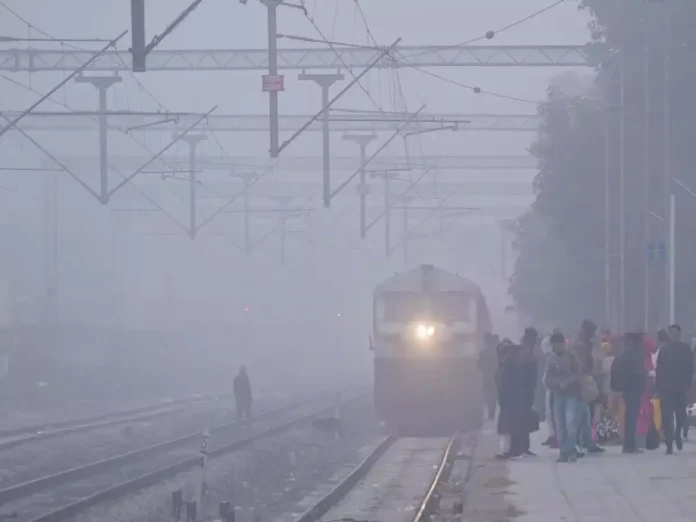Delhi and its surrounding areas continue to grapple with the effects of dense fog and cold waves on Wednesday, leading to significant disruptions in train and air travel, as well as deteriorating air quality across the national capital.
Indian Railways reported that 26 trains are experiencing delays due to reduced visibility caused by the persistent fog. Among the most affected trains are Bihar S Kranti (12565), delayed by 285 minutes, Shr Ram Shakti Exp (12561) delayed by 290 minutes, and Gorakhdham Exp (12555) by 255 minutes. Other major delays include NDLS Humsafer (12275) by 195 minutes and Mahabodhi Exp (12397) by 160 minutes. The delays have caused major inconvenience for passengers across the country, as dense fog has hindered rail operations for several days.
At Indira Gandhi International Airport (IGIA), flight delays have been reported due to reduced visibility caused by fog, impacting both domestic and international air traffic. Passengers are urged to check flight schedules in advance.
Meanwhile, the air quality in Delhi has worsened, dropping to the ‘very poor’ category, with the Central Pollution Control Board (CPCB) recording the AQI at 344 as of 7 a.m., up from 252 at the same time yesterday. Various areas of the city reported hazardous levels of pollution, with Vivek Vihar recording the highest AQI of 414, indicating severe pollution levels. Other areas such as Lodhi Road, Mandir Marg, and Nehru Nagar have reported AQI readings exceeding 370, marking alarming pollution levels.
As cold waves continue to affect the city, the winter chill is intensifying, with temperatures dipping further. In response to the freezing weather, many homeless individuals have sought refuge in night shelters throughout the national capital.
The winter chill and fog have also affected other parts of Northern India, where severe fog conditions have led to disruptions in road and rail traffic. This ongoing weather pattern continues to have a profound impact on daily life, with public health and transportation authorities working to address the challenges posed by these conditions.


